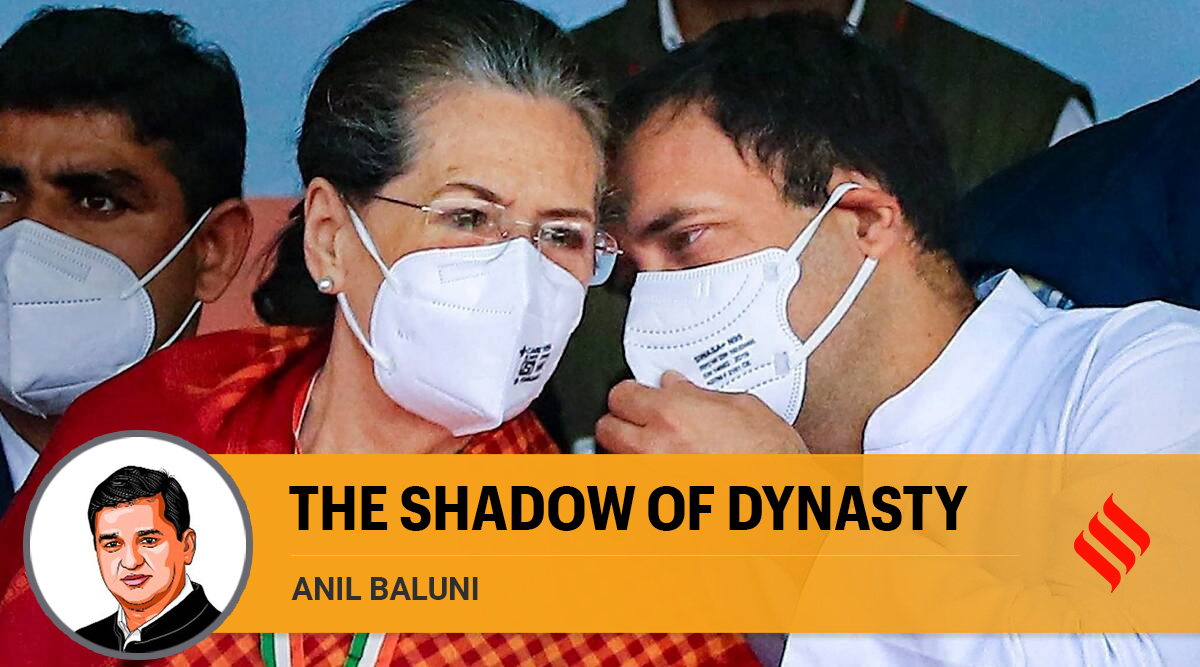 Congress president Sonia Gandhi and MP Rahul Gandhi, during the party's 'Mehangai Hatao Rally' against the Central government, in Jaipur. (PTI, file)
Congress president Sonia Gandhi and MP Rahul Gandhi, during the party's 'Mehangai Hatao Rally' against the Central government, in Jaipur. (PTI, file)India emerged as a multi-party democracy because the creators of our Constitution wanted to ensure that in a large and diverse country such as ours, every citizen gets an equal chance in governance. The basic tenet of our Constitution and democracy is to empower the poorest of the poor so that they can also reach the highest public office.
However, from the very beginning, the foundations of our multi-party system were shaky. There are two main reasons for this aberration. One, the politicisation of the Indian National Congress, primarily formed to steer our freedom movement, led to the total control of one dynasty over the party. Second, the betrayal by the Congress governments of the people in states where it formed its government and its total apathy towards regional aspirations.
The latter led to the growth of state-based political outfits, which were primarily offshoots of the Congress or were led by regional satraps. Unfortunately, all these parties were overtaken by political stalwarts who drew lines of succession from within their families. Internal democracy was completely stifled within these political outfits. A trend that the Congress started in Indian politics was ruthlessly adopted by these state-based dynasts.
Prime Minister Narendra Modi has repeatedly warned the nation, which is so diverse socially and culturally, is being weakened due to dynasty politics. The time has come to fight this evil. We must push for more representation and participation of the people in democratic processes. The need of the hour is to bring more youngsters from diverse backgrounds into politics.
Best of Express Premium
In the past four-five decades, family-based parties have choked talent and created roadblocks to the development of states. Dynasty-based political parties have neither ideology nor vision. Their only goal has been to grab power and cling to it. This resulted in these parties playing the politics of vote-banks and appeasement. The Congress adopted the same strategy at the Centre. Today, the Congress is no longer a national party. It has been reduced to the party of a brother-sister duo.
So engrossed were these parties in serving the interests of their kith and kin that they completely ignored “overall development” and “holistic growth”. They shunned all those sections of our society that needed their attention — villagers and farmers, Dalits and backward classes, women and youth. Under dynastic rule, the dangerous and negative politics of appeasement flourished which led to the poor getting poorer while the oppressed were reduced to second-class citizens.
It is due to the political idiosyncrasies of family-based parties that India could not resolve perennial issues like the removal of Article 370 from Jammu and Kashmir, freedom of Muslim women from triple talaq, and the construction of a grand Ram temple in Ayodhya. The root cause of these nagging problems was the politics of appeasement and vote-banks furthered by dynasty-based parties.
These parties opposed the bills to scrap Article 370 and triple talaq. They also played with India’s safety and security, first by weakening India’s response to terrorism when they were in power and later by questioning the valour of our armed forces post the cross-border surgical and air strikes.
Dynasts are not concerned with the problems of the country and society. They care only about their vote banks and the “growth” of their “family”. It is for this reason that three-fourths of our population had no bank account even after 70 years of Independence, poor women had no access to LPG cylinders, the poor had no health insurance, farmers were fleeced by moneylenders, crores of households had no water and electricity and the poor had no homes.
The common man had deep anger and mistrust over the politics of dynasty, vote-bank and appeasement. His anger started coming out in 2014 when he saw in Narendra Modi a hope for the nation and himself. He has seen the nation and its politics changing fast. He has seen banks going to the doorstep of the poor, the poor getting houses, free medical insurance and free rations during Covid, and farmers getting much-needed financial aid directly into their bank accounts.
Post-2014, India has seen two leaders from very humble backgrounds becoming President and PM. This is the New India about which the world is talking today. India has reclaimed its position as a true global leader.
There is a disturbing trend today as every decision of the government is being seen through the prisms of regionalism and communalism. People are also wary of the increasing number of family-based parties. The nation needs broad-based political reforms for our democracy to thrive.
PM Modi has talked about overhauling our electoral system. We need to think seriously about it. A commission on political reforms suggested a reduction in the number of political parties and their reorganisation based on ideology. But though there has been no movement in this direction, it’s heartening that the electorate has rejected parties dominated by dynasts. The recent election results in five states is the latest indicator of this trend.
A healthy and vibrant democracy can grow on the strength of nationalist parties. The BJP has been persistently fighting family-based political outfits. Under the dynamic leadership of PM Modi, we have been able to fight the politics of casteism, dynasty, nepotism and appeasement. The struggle to rid the nation of dynasty politics is long and hard. Its effect must be felt in all parts of the country — from Maharashtra to Telangana, from Bihar, Uttar Pradesh, Jharkhand to Jammu & Kashmir and Tamil Nadu.
The writer is an MP and BJP’s National Media Head
- The Indian Express website has been rated GREEN for its credibility and trustworthiness by Newsguard, a global service that rates news sources for their journalistic standards.

